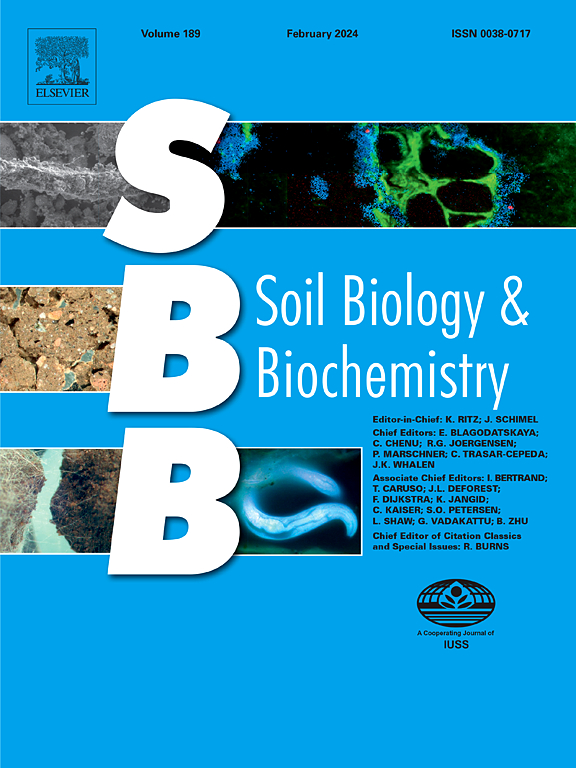Response of wheat to arbuscular mycorrhizal fungi inoculation and biochar application: Implications for soil carbon sequestration
IF 9.8
1区 农林科学
Q1 SOIL SCIENCE
引用次数: 0
Abstract
The sequestration of atmospheric CO₂ in soil is suggested as an effective climate change mitigation strategy. Biochar application shows promise in this regard, while the role of fungi in soil carbon cycling and sequestration is also under investigation. Using a novel high-throughput plant phenomics approach, we explore the impact of arbuscular mycorrhizal fungi (AMF) inoculation and biochar application on wheat growth and soil carbon, guided by one of the leading global carbon credit schemes. Wheat was successfully colonised by AMF, achieving an average root length colonisation of 35.9%. We uncover an indirect fungal-mediated pathway to soil carbon sequestration, with mycorrhizal plants generating more biomass across all soil treatments without yield penalties, suggesting colonised plants deliver more plant derived carbon to the soil, potentially leading to long-term soil carbon gains. Conversely, fungal-driven carbon loss occurred, significantly reducing soil carbon accumulation in unamended soil, but not in biochar-amended soil, suggesting that biochar moderates fungal activity and positively impacts the soil carbon balance. While both biochar and AMF enhance plant growth, their direct effects on soil carbon are complex. Although biochar did not significantly increase soil carbon stocks beyond its own contribution, its ability to regulate fungal activity could play an important role in influencing soil carbon sequestration.
小麦对接种丛枝菌根真菌和施用生物炭的反应:对土壤固碳的影响
在土壤中封存大气中的二氧化碳被认为是一种有效的减缓气候变化的策略。生物炭的应用在这方面显示出前景,而真菌在土壤碳循环和固碳中的作用也在研究之中。在全球领先的碳信用计划的指导下,我们利用一种新型的高通量植物表型组学方法,探讨了接种丛枝菌根真菌(AMF)和施用生物碳对小麦生长和土壤碳的影响。小麦成功地被AMF定殖,平均根长定殖率达到35.9%。我们发现了一条由真菌直接介导的土壤固碳途径,在所有土壤处理中,菌根植物都能产生更多的生物量,而不会影响产量,这表明定殖植物向土壤提供了更多的植物碳,可能会带来长期的土壤碳增益。相反,真菌导致碳损失,显著减少了未改良土壤中的土壤碳积累,但生物炭改良土壤中的碳积累却没有减少,这表明生物炭能缓和真菌活动,并对土壤碳平衡产生积极影响。虽然生物炭和 AMF 都能促进植物生长,但它们对土壤碳的直接影响却很复杂。虽然生物炭在增加土壤碳储量方面的作用并不明显,但其调节真菌活动的能力可在影响土壤固碳方面发挥重要作用。
本文章由计算机程序翻译,如有差异,请以英文原文为准。
求助全文
约1分钟内获得全文
求助全文
来源期刊

Soil Biology & Biochemistry
农林科学-土壤科学
CiteScore
16.90
自引率
9.30%
发文量
312
审稿时长
49 days
期刊介绍:
Soil Biology & Biochemistry publishes original research articles of international significance focusing on biological processes in soil and their applications to soil and environmental quality. Major topics include the ecology and biochemical processes of soil organisms, their effects on the environment, and interactions with plants. The journal also welcomes state-of-the-art reviews and discussions on contemporary research in soil biology and biochemistry.
 求助内容:
求助内容: 应助结果提醒方式:
应助结果提醒方式:


